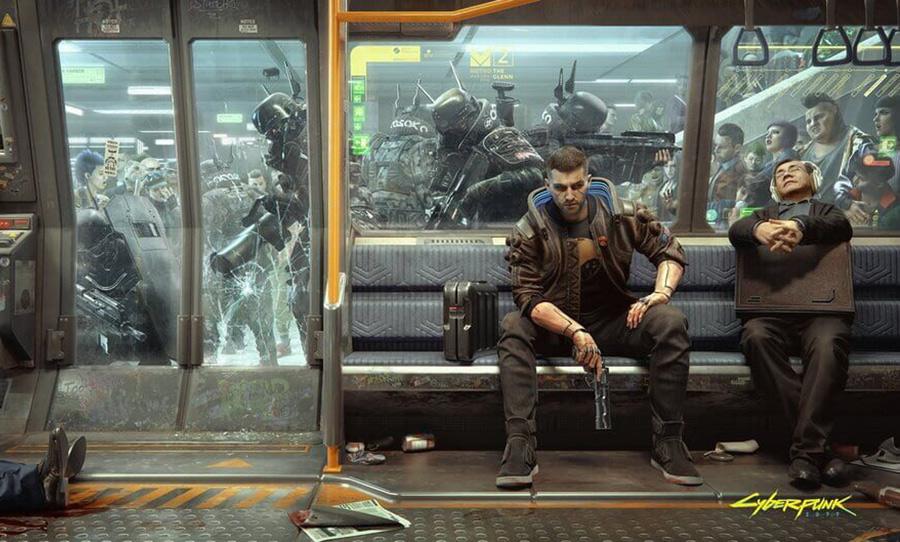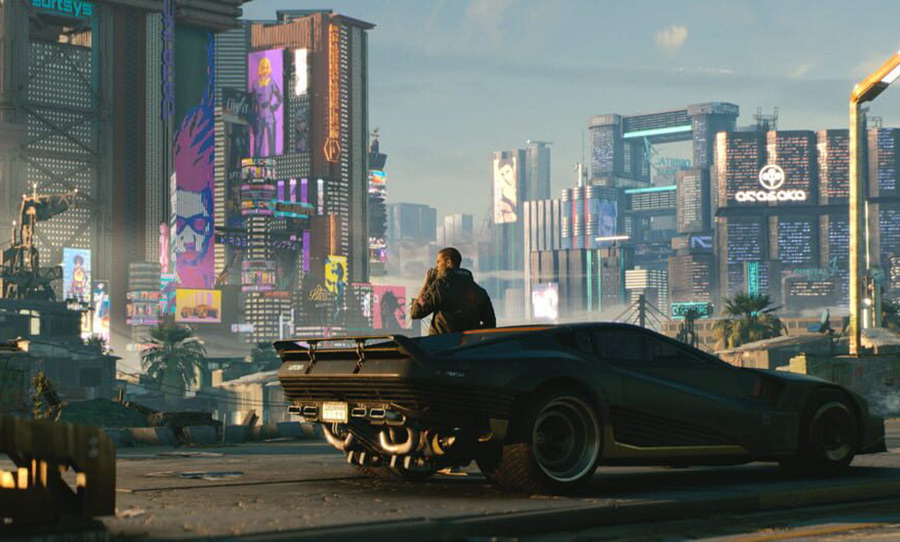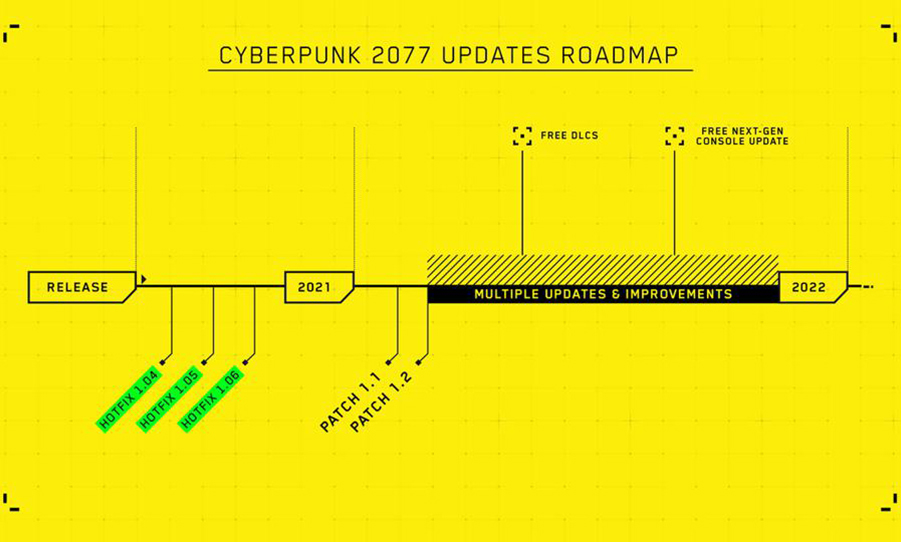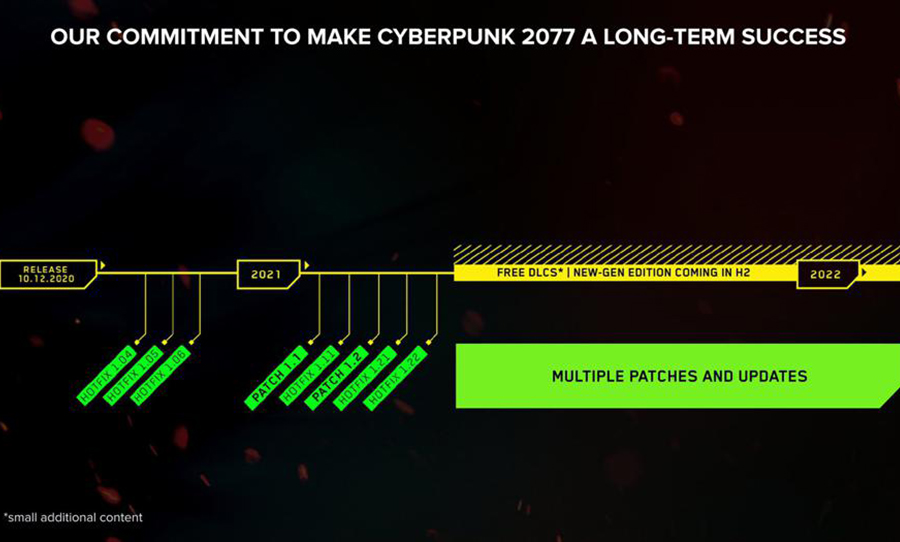Cyberpunk 2077 has had a tumultuous journey leading up to and beyond its release in 2020, with scandals and mishaps at every turn – here’s everything you need to know about what went wrong for CD Projekt RED.
The tragic tale of Cyberpunk 2077′s failures on its journey to and beyond release in late 2020 is a story that many jaded fans are all too familiar with. There’s been lots of drama, and plenty of mishaps to keep track of though, so you’ll be forgiven if you’ve missed a scandal or two.
Look no further if you want to get up to date on everything that’s happened (so far) – here’s a comprehensive timeline of what went wrong with Cyberpunk 2077. Consider it a lesson in what not to do if you ever find yourself in the position to release a highly anticipated AAA video game.

An eager announcement
To understand the history of Cyberpunk 2077, you have to first go right back to its start. The game was first announced in 2012, while CD Projekt RED was in the depths of production for The Witcher 3, which would be released in 2015, going on to become one of the most highly acclaimed modern RPGs.
At the time, the developers promised their new game would set a new standard for futuristic RPGs – a promise that they have clearly failed to uphold.
The first teaser was then released in 2013, with a stylish trailer offering an ambitious glimpse into the world at the centre of the game. Fans’ hopes were set high, despite the fact that development had not even begun.
Unrealistic approaches
Pre-development on Cyberpunk 2077 was inevitably not a priority in the lead up to the release of The Witcher 3, with a majority of CD Projekt RED’s staff being assigned to complete that project. After the Blood and Wine DLC was released in May 2016, production on Cyberpunk 2077 could finally take center stage.
Riding the success of The Witcher 3 resulted in an unrealistic approach to the new game’s development. It’s clear that CD Projekt RED got ahead of themselves, making ambitious promises that they had no way to fulfil, inevitably setting themselves up for failure.
A staff member told Bloomberg that the development process was like trying to drive a train while the tracks are being laid ahead of you – their vision for the project was so advanced that the technologies they required were being developed at the same time as the game itself.
A much more successful game could have been created if CD Projekt RED took a step back and aimed a little lower. In trying to find ways to innovate and step up the ‘wow factor’, they neglected the simple fact that a great game is one that lets players have a good time.
Changing conceptions
Bloomberg’s report also revealed the extent to which the vision for Cyberpunk 2077‘s gameplay changed throughout the development process. Fundamental shifts to the gameplay occurred in 2017, after studio head Adam Badowski took over as director and demanded several major overhauls.
Everything changed over the next year, with several top developers resigning due to their perspectives ultimately clashing with Badowski’s.
The game was initially meant to be third person and feature flying cars, with the final result being a first person game (with no flying cars in sight). Other features were added to the game at a late stage, such as the police being thrown in at the last minute, which led to some disjointed gameplay mechanics.
The first ‘gameplay’ trailer emerged in 2018 at E3, showing off CD Projekt RED’s current vision for the game, which was now a year into development. While it did its job of amping up fan excitement another notch, the trailer’s promises were misleading, and made mostly from fake footage that does not reflect actual gameplay.
Time spent creating the trailer even took away from development time for the game itself, with poor time management beginning to emerge as a major issue that would negatively impact the fans and developers alike.
Development dramas
In a world ruled by cancel culture, it’s not surprising to see fans calling out elements of games that are deemed as problematic or politically incorrect. That being said, you would expect the game to actually be released before such scandals emerge, right?
That has not been the case for Cyberpunk 2077.
One of the game’s earliest controversies involved a since-deleted tweet from the game’s official account in 2018. In response to a tweet about wanting more guys in an image, @CyberpunkGame tweeted “did you just assume their gender?!” – a remark that sparked debate about whether or not it was intended to mock transgender people.
While the account apologised, gender-related scandals continued to emerge. An image of an in-game poster featuring a transgender model, and slogans referencing mixing flavours, circulated on social media in 2019; with many citing it as another example of CD Projekt RED using transgender people as a punchline.
Another gender-centric controversy emerged the same year, when game artist Mathe Jonkers told Metro that there wouldn’t be simple male or female options offered in the character creation process – rather, you mix and match features like body types, voices and hairstyles (and even customise cybernetic genitalia). This was interpreted by many as the company’s attempt to cover up their previous actions and pander to critics, though it’s unclear how much of the system was shaped by community criticisms.
Cyberpunk 2077 is wild to me because they used a trans womans body to generate controversy to bring attention to their game and then defended it by saying that the corporations in cyberpunk coopt gender nonconformity to sell products. You know, literally the thing CDPR did.
— Ava (@IikeClockwork) December 5, 2020
Ongoing miscommunications
However, the mounting number of problematic reveals throughout Cyberpunk 2077‘s development were not limited to issues of gender, with miscommunication becoming a major issue for consumer relations.
Race inevitably became another point of controversy with the reveal of two rival gangs: The Animals and Voodoo Boys. With The Animals appearing to consist largely of people of colour, many interpreted the gang’s name as racially charged. There were also concerns surrounding the racially stereotypically name, design and background of the Voodoo Boys.
CD Projekt RED later clarified that The Animals are a multi-racial gang, with their initial portrayal in a specific gameplay demo not being representative, which had not previously been clear. Mike Pondsmith, creator of Cyberpunk 2020 even stepped in on Reddit to clarify the game’s intentions in a somewhat aggressive manner:
“The original Voodoo Boys were a scathing commentary on cultural appropriation… Who the (bleep) do YOU think you are to tell ME whether or not MY creation was done right or not?”
CD Projekt RED’s communication issues went on to cause controversy beyond politics, with a lack of clarity causing confusion on topics such as the gameplay perspective. A similar issue arose in 2020 when the company’s president implied that the game would have microtransactions, when fans previously believed that it would not.
It was later clarified that the game would not, in fact, feature microtransactions. Despite a desirable outcome for players, the drama that divided the fanbase because of the company’s apparent miscommunication is a clear lesson on the importance of transparency.
Nothing changed. Cyberpunk 2077 is a single player game with zero microtransactions. One single purchase. No tricks. Don't believe the clickbait. https://t.co/qX0iZwsAf2
— Cyberpunk 2077 (@CyberpunkGame) September 7, 2020
Delays upon delays
As Cyberpunk 2077’s release date got closer throughout 2020, the game hitting shelves actually got further away. The initial date projected for release was April 16, which was first moved back to September 17.
This six month delay was pretty reasonable considering the impacts of the COVID-19 pandemic, which hit most game development studios pretty hard and caused plenty of shifting timelines. It soon became clear that this delay was not long enough to complete the game, however, so it was delayed again to November 19.
And then once more for good measure, with December 10 becoming the game’s final release date. While continuous delays caused by unrealistic schedules were frustrating for fans, who had already felt misled by CD Projekt RED on many occasions (which is still no grounds for sending death threats to developers), pushing back the release of the game would likely have been understood; particularly if it meant the developers could eventually release a polished title, while still maintaining healthy working conditions for their staff.
Unfortunately, it seems that CD Projekt RED failed to meet either of these criteria, even with the three delays. ‘Crunch’ was a major issue amongst developers, who reportedly felt pressure to work overtime despite it not being mandatory.
The game’s former audio programmer, Adrian Jakubiak, told Bloomberg there were times when he would crunch up to 13 hours a day, 5 days a week. He even reported having friends who lost their families because of their absurd work schedules.
Pushing developers past their limits and creating an unhealthy working environment is never acceptable, but the sting is even more bitter when the resulting game isn’t even finished to an acceptable standard.
Devs at CD Projekt said despite promises that crunch would not be mandatory, they felt pressured to work overtime on and off for years. I can't share all the stories, but here's one on the record that may help explain why it's been infuriating to see people downplay CDPR's crunch pic.twitter.com/Qne7pti2tT
— Jason Schreier (@jasonschreier) January 16, 2021
Cross-generational conflicts
One of the reasons cited for Cyberpunk 2077‘s final delay was the struggle of launching the game across so many platforms, instigating widespread debate about the cross-generational nature of the game.
On one hand, people were concerned that the PS4 and Xbox One versions of the game would impact the quality of the next-gen editions. This fear has proven partially true, with CD Projekt RED confirming that the PS5 and Xbox Series X versions of the game would have day one upgrades, but not become ‘full’ next-gen versions until a later date.
On the other hand, some fans worried that the next-gen editions of the game would be the ‘real’ versions of the game, resulting in performance downgrades for previous-gen editions. There wasn’t much evidence for this theory, which keeps resurfacing every other time a game is confirmed as cross-gen, but Cyberpunk 2077‘s release has indeed demonstrated less than ideal performance on last-gen consoles.
This wasn’t the only controversy arising from the game’s existence on so many platforms, either – after game reviewers were only given the PC version of Cyberpunk 2077, early critic scores ahead of release reflected the comparatively stable computer version. These potentially manipulative reviews made the disastrous performance quality that emerged on PlayStation and Xbox consoles even more shocking to players.

A premature release
So we’ve finally reached the point of the game’s actual release – December 10, 2020. Despite the long journey, filled with overworked developers and numerous delays, it was (and still is) hard to classify Cyberpunk 2077 as finished.
The game was absolutely riddled with bugs and glitches on release. Some of these were hilarious, such as a NSFW bug revealing V’s penis through their clothes, or the accidental overabundance of dildos in the game.
It wasn’t all fun and dicks, though – the game’s quality was severely impacted, being virtually unplayable on last-gen consoles. Class-action law suits even emerged over claims of being mislead, making it clear that CD Projekt RED was in some serious trouble.
Other major issues of concern included an epileptic seizure-inducing game mechanic, which posed a real risk to photosensitive players and didn’t come with an adequate warning. On a much less concerning level, Australian copies of the game featured the typo ‘manufactured in Autralia’ – just another error in a vast sea of them.
Within days of the initial release, CD Projekt RED released a statement apologising for the game’s performance on previous generation consoles, promising mass fixes and patches would bring the game up to the standard that they promised (and had eight years to create).
They also proposed that unsatisfied gamers could opt for a refund, with Sony and Microsoft expanding their refund policies to accommodate returns of the game. Cyberpunk 2077 was even pulled from the PlayStation Store, though the Microsoft Store continued to make the game available.
Initial hotfix patches were also released to start fixing issues within the game, but there was a long road to redemption ahead.
— Cyberpunk 2077 (@CyberpunkGame) December 14, 2020
Trying to make amends
If 2020 was a bad year for CD Projekt RED, 2021 might have started off even worse. In February, the Polish developers revealed that they had been hacked, with an anonymous operator having gained access to the inner workings of their company, and even threatening to reveal massive amounts of privileged data.
The hackers reportedly sold their stolen data, so now it’s apparently just floating around out there somewhere on the internet waiting to be weaponised. The developer’s reputation has already been tarnished, so perhaps they have little left to lose at this point, but the potential for future disaster is never a good thing.
Despite a tough beginning to the year, CD Projekt RED has been working to make amends for the unsatisfactory product they released. One early step on this road to repair was the release of official modding tools, essentially letting players fix and change the game to suit their preferences.
A roadmap for updates was given in early 2021, which was remarkably vague (it didn’t even have concrete dates), yet the developers still managed to fail to stick to it. The first patch didn’t do a whole lot to improve the glitchy last-gen versions of the game – in fact, it added in a whole new game-breaking bug. That’s right, the patch required a patch.
With the hacking scandal halting work at the studio for two weeks, the second major patch was then delayed to the second half of March, after initially being teased for February. It certainly seems that bugs and delays may prove to be a persistent trend.

Where are we now?
So we’ve reached the middle of 2021 – what is the state of Cyberpunk 2077 now?
The game returned to the PlayStation Store, after receiving a big update with Patch 1.23, where it now features the warning:
“IMPORTANT NOTICE: Users continue to experience performance issues with this game. Purchase for use on PS4 systems is not recommended.”
Microsoft will also soon be rolling back its extended refund policy, so it appears that Cyberpunk 2077 will be back to having a pretty standard status on online stores.
An updated roadmap has been released by CD Projekt RED, where they’ve pledged their “commitment to make Cyberpunk 2077 a long-term success”. Their dedication is commendable, but the new roadmap remains incredibly vague, and it’s hard to imagine that they’ll be able to remain on track.
While they endeavour to make a game that’s really worth playing, they’ll also have to deal with the four separate lawsuits that have now been combined into one mega lawsuit.
So here we are, nine years on from the announcement of Cyberpunk 2077, and it still feels like an unfinished game. It seems that CD Projekt RED will keep persevering with their efforts to save the game; so those who already bought it can continue staring longingly at the light at the end of the tunnel. It’s probably not a train, right?
Here’s hoping that they can finally get rid of the glitches, smooth out the performance and make the game properly playable.




